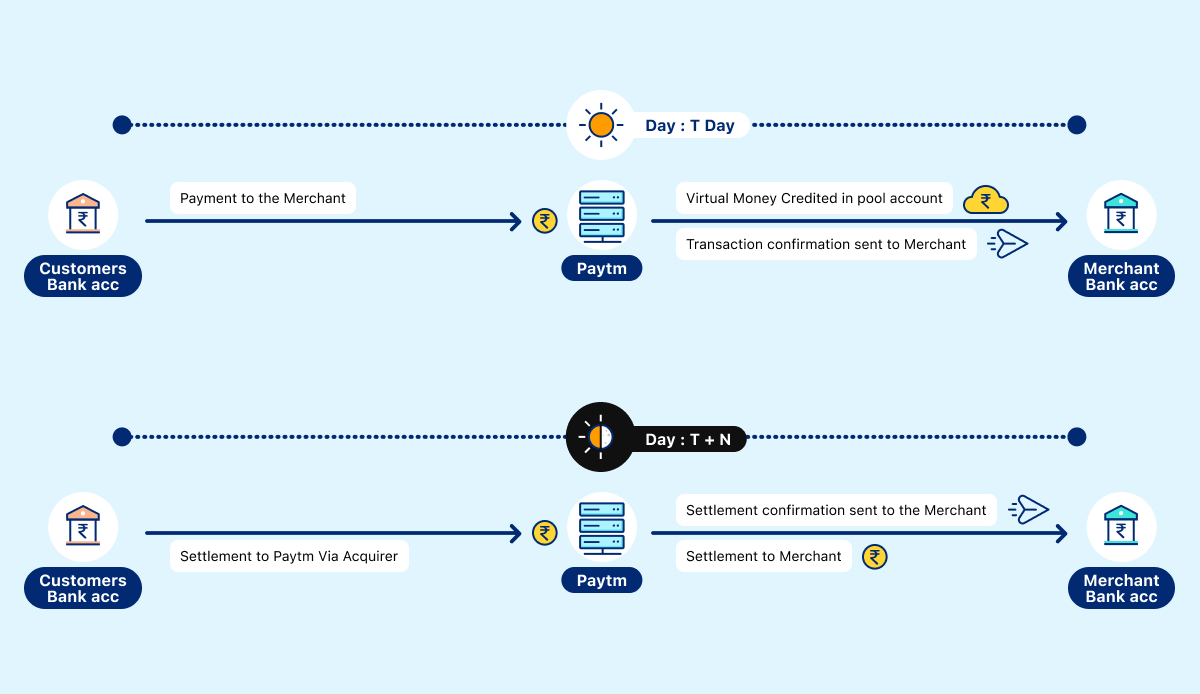Paytm offers T+N Settlement as well as Same Day (or Early Settlement). Paytm offers multiple early settlement services which merchants can opt for with minimum fees as per the business type and applicability. Paytm recommends you to choose your settlement cycle during commercial closure, which can be modified later based on your business needs.
It is a crucial part of the payment processing cycle in the context of electronic payments. Here's how merchant settlement typically works:
- Customer Transactions: When a customer makes a purchase at a business or online store using a credit card or debit card, the transaction is processed through a payment gateway or payment processor. The customer's card information is verified, and the payment is authorized.
- Authorization: During the authorization process, the payment processor checks whether the customer's card has sufficient funds or credit limit to cover the purchase. If the transaction is approved, the funds are placed on hold.
- Money Received from Customers: This refers to the payments made by your customers using Paytm as a payment method for goods or services.
- Batch Processing: Throughout the day, the merchant accumulates a batch of authorized transactions. Typically, At the end of the business day or at specific intervals, these transactions are batched together for Settlement.
- Settlement: The settlement process involves the transfer of funds from the Nodal to the merchant's bank account. This typically occurs within a few business hours or at the T+N cycle after the transactions are batched.
- Deduction of Fees: Paytm deducts certain fees or charges before transferring the settled amount to your bank account. These fees may include transaction processing fees or service fees for using the Paytm platform.
- Bank Account Deposit: The final step in the settlement process is transferring the settled amount to your designated bank account. Overall, the settlement process ensures that the money collected from your customers through Paytm is batched and transferred to your bank account. The settled funds are deposited into the merchant's bank account. This is when the merchant officially receives the payment for the goods or services sold to the customer.
- Reconciliation: The merchant reconciles the settled funds received in their bank account with the corresponding transactions in their records. This helps ensure that all payments have been received correctly. Merchant Settlement is crucial for businesses to manage their cash flow and finances efficiently. Additionally, it helps merchants track their revenue, monitor transaction fees, and reconcile their financial records accurately.
- Post Settlement Communication: Paytm notifies merchants of any pending or failed settlements at least once a day.
a. P4B Push Notifications and SMS are sent on each Successful, Failed, and Pending settlement.
b. WhatsApp communication is sent for Failed settlements.
c. Failed Settlement communications are sent once a day for the next 90 days in case of long failing payouts. Failed settlement could be due to the following reasons:
- Bank account closed
- Bank account or IFSC or Beneficiary Name is invalid
- Bank account frozen
- Bank account dormant
- Bank account limit breached
- Failed by beneficiary reason due to any other reasons
d. Pending and Long Pending Settlement Communications are being sent after 90-120 minutes to incorporate the delayed response from the beneficiary banks.
e. Each communication clearly mentions the required actions to be taken, such as change of bank account, KYC required, transfer balance from wallet, etc.
All payment transactions of a customer using Paytm as well as refunds for given orders post-settlement are reflected in the Settlement Report. Net Settlement amount is transferred to the merchant's bank account after netting off commissions, refunds, and any other applicable deductions.
Net settlement amount calculation happens as mentioned below:-
Net settlement amount= Payments accepted(-)Commission(-)GST(18% of commission fee) (-) Any other deductions (such as Rental/ Refund/ Chargeback/ Reversal/ Recovery)
 Note: If as a merchant you have opted for any services, the VAS deductions are made against any value-added service which can be as mentioned in the below section.
Note: If as a merchant you have opted for any services, the VAS deductions are made against any value-added service which can be as mentioned in the below section.
